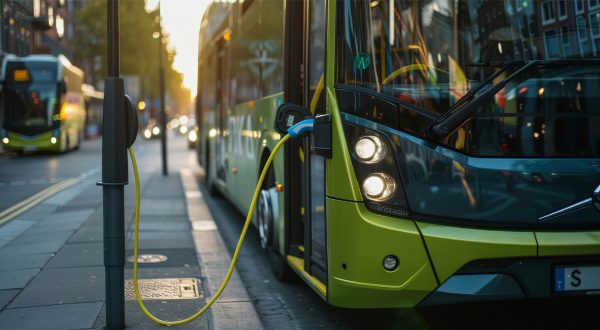EM Lyon Business School has opted to equip its campus with electric bikes that can be charged wirelessly. Alongside renewable energies, the technology is of particular interest to local authorities and businesses since it delivers a solution to changing trends.
![]()
A first charging station for electric bikes has been launched at the Ecole de Management (EM) Lyon Business School in Ecully just outside Lyon, followed by two further stations of 10 bikes, as part of a scheme designed to enable students and staff to reach the city centre as easily as by car. A key feature of the facility is that the bikes are charged wirelessly, a technology that further simplifies use.
Supported by a unique smartphone app, the user takes the bike from a terminal which not only provides secure docking but also charges it without a cable. The transmitter built into the terminal transfers useful energy to the receiver – the bike’s battery – without any manual connection. Thanks to a 300 W battery, the bike charges in two and a half hours, obtaining 50 km of range.
By removing the need for a cable, which provided the continuity between petrol-powered cars and the first generation of electric vehicles, wireless or inductive charging marks a symbolic and practical break for drivers. “It’s the way forward for cars,” claims Lyonel Escot, founding partner of B2ebike, the company deploying the bikes on the EM Lyon campus.
Following on from Tesla, Porsche presented an all-electric cross utility vehicle featuring inductive charging in early 2018. A transmitter located in a ground-based pad transfers the energy needed to charge the car to a receiver integrated into the underside of the car, using an electromagnetic field. All without contact.
Simplified mobility
Citeos Lyon, the VINCI Energies business unit responsible at EM Lyon for connecting the equipment supplied by B2ebike, is focusing on this cutting-edge technology as part of an e-mobility offering for campuses that incorporates a renewable energy dimension. “Often located outside towns and cities,” says Julien Lemoine from Citeos, “campuses require simplified mobility solutions for students, and benefit from having space available to install solar PV panels, on building rooftops for example, or even wind turbines.”
“By travelling at 20-25 km/h on an e-bike, you can get around town as fast as in a car”
Already sensitive to environmentally friendly solutions, local authorities and businesses alike are looking into electric bike stations that offer wireless charging. “People live within 8 km, on average, of their place of work, and by travelling at 20-25 km/h on an e-bike, they can get around town as fast as in a car,” states Lyonel Escot, from B2ebike. “Smart grids, solar power, inductive charging… these are all technologies emerging in towns,” says Julien Lemoine from Citeos.
15/11/2018
Learn more:
01net.com


